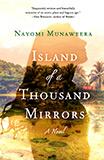Summary | Excerpt | Reading Guide | Discuss | Reviews | Beyond the Book | Readalikes | Genres & Themes | Author Bio

Having accomplished this feat with no more than the usual traumas, she grows up in a large white house in Wellawatte, one of the more distinguished neighborhoods of Colombo. Separated from the ocean only by the railroad tracks, and a short but dignified distance away from the Wellawatte vegetable market, the house is ruled by Visaka's father, the Judge, who, Oxford returned, insists upon a painful formalism learned in undergraduate days when he was made to feel the unbearable shame of brownness. In tribute to those frigid days, ankles are crossed, accents carefully monitored, pinkie fingers trained to point away from teacups. The family eats puddings and soups, beefsteaks and muttonchops, boiled potatoes, orange- and crimson-tinted sandwiches. They take tea at five, with sugar and milk, choose pastries off a multilayered silver tray. In December, there is Christmas cake, fruitcake, cheesecake. The dressmaker comes monthly. Visaka is chauffeured to school in her father's car and picked up at the gate after. On Tuesdays, she has elocution lessons and on Fridays she practices Bach and Beethoven for two hours on the baby grand piano.
Yet the heart of the house is an interior courtyard, built in the days of the Portuguese, who liked to keep their women sequestered in these interior gardens, full of spilling foliage, birdcall, and monkey chatter. Annoyed by this exuberance and lack of order, the Judge sends the gardener to rip and uproot. But days after these attacks, the mutilated branches send forth vines to
once again wind into the embrace of the wrought iron balcony. Birds return once again to build nests in the outstretched arms of the trees. The queen of this domain, an enormous trailing jasmine, impervious to pruning, spreads a fragrant carpet of white. When the sea breeze whispers, a snowy flurry of flowers sweeps into the house so that Visaka's earliest and most tender memory is the combined scent of jasmine and sea salt.
It is into this pulsing, green space that she escapes after the boiled beef and vegetables. It is here she plays her childhood games, befriended at a distance by the birds, the geckos and
squirrels. She says of her variously prim and jungled childhood, "It was like growing up in a garden of Eden in the middle of coldhearted England."
A photograph from this time witnesses the whole family suited and saried on the front lawn, Colombo heat perceptible only in the snaking tendrils that cling to the women's cheeks and necks. Our mother is flanked by her two much older sisters, each beautiful in an entirely different way. One, round-faced and dark like a plump fig, succulent. The other tall, slim, and elegant, calling to mind something lunar.
Our mother, a sapling next to these hot house beauties, poses on the edge of an ebony chair. A serious, spectacled schoolgirl in long braids and a stiff, ironed uniform, she is caught in a blur as if about to run off. Her formidable mother, Sylvia Sunethra, wears a sari in the old Victorian way, all ruffled sleeves, starch, and ramrod straight posture, her hand on the girl's shoulder holding her down. Behind them all, her handsome brother, Ananda, debonair in a three- piece suit. In the chair sits the Judge, who despite his profound baldness looks too young to be the father of these grown children.
The photograph gives no forewarning. Yet it captures the end of my mother's childhood, because if we enter with the certainty of history into the secret, red passageways leading to my grandfather's heart, we see lurking within his tissue- thin arteries an amoeba- shaped blood clot that will lead him to sit up in bed six months later, clutching at his chest. He will not die of this first stroke, but some years later under the assault of successive ones and in the midst of his house- building obsession.
It is around the time of this photograph that our mother remembers the coming of Alice. Male relatives from the Judge's ancestral village squat on the verandah waiting for the Judge. With them, a woman, face obscured behind her sari pallu. Our mother remembers the outline of a large, fair- skinned face, round as the full moon, long, she- deer eyelashes. And over the left shoulder, stretching the cheap cloth of the sari blouse, an enormous, quivering hump. "This is Alice Nona," the men say and meticulously retrace the capillaries of familial blood that make her "our people."
Excerpted from Island of a Thousand Mirrors by Nayomi Munaweera. Copyright © 2014 by Nayomi Munaweera. Excerpted by permission of Thomas Dunne Books. All rights reserved. No part of this excerpt may be reproduced or reprinted without permission in writing from the publisher.
What really knocks me out is a book that, when you're all done reading, you wish the author that wrote it was a ...
Click Here to find out who said this, as well as discovering other famous literary quotes!
Your guide toexceptional books
BookBrowse seeks out and recommends the best in contemporary fiction and nonfiction—books that not only engage and entertain but also deepen our understanding of ourselves and the world around us.